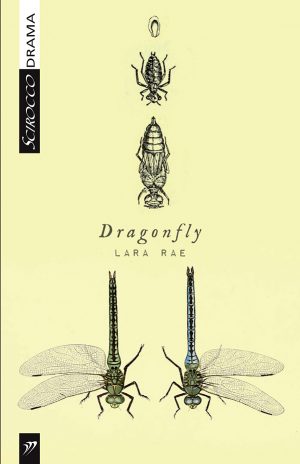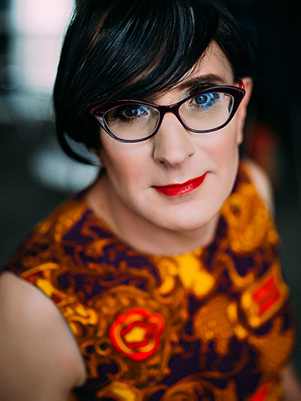Posted June 5, 2023
The Interview – Lara Rae
Lara Rae
Lara Rae is a writer and stand-up comedian. Her play Dragonfly, won the 2020 Chris Johnson Award. Lara is one of the co-developers of the internationally acclaimed television comedy Little Mosque on the Prairie and the creator of the radio series Monsoon House starring Russell Peters. Lara was the first trans woman to host the CBC flagship news program The Current. Lara’s food project, PANTRY, feeds people in Winnipeg’s West Broadway neighbourhood.
As we celebrate Pride Month, could you share some of your thoughts about the representation of trans people in popular culture? Why is it important for plays like Dragonfly to be performed?
We are still obsessed with tragedy and sadness. We have to show victory too. We are still often literally sacrificed in the plot (we die) in order to make a cis person a better human. This should not be our role or our job. We just need to be regular folks. It’s why I do background work in Hollywood films that shoot here. To see me at a table drinking coffee and it be normal is just as important as the big stories and biopics.
Dragonfly is the story of a trans woman’s journey, related by two characters named “They” and “Them.” Can you tell us about these characters and about why you decided to tell the story using two voices?
Part of it was practical. I wrote an early version for Sarah but did not want to write a 70-minute one-person show. There are far too many one-person shows in theatre. I like dialogue and drama. Also, it was a way to show two aspects of a person without saying this is the boy and this is the girl. In another production the male-appearing and female-appearing actors (both were non-binary) reversed the roles Sarah and Eric played in the original. To hear a male-appearing actor do the rape scene as opposed to the female-appearing was definitely a different experience. Many tone shifts occur depending on the actors and their actual or perceived genders.
Although Dragonfly deals at times with difficult subject matter such as substance abuse and sexual violence, the dialogue is very poetic. Did you begin with the idea of using blank verse, or was that something that developed as you began working on the play?
Once we came up with the idea this would not be two characters as much as aspects of the “inside voice” of a transwoman (this was a little bit of an inside joke as I famously have no inside voice) then the poetical or what I call hyper-realistic way of speaking came out. I also love music but have no coordination and rhythm in my body—but in my mind I can quickly get into a musical flow with my writing. I am one of those people who find it near to impossible to visualize anything. I am a totally verbal person and spoke, read and wrote early.
The Manitoba Association of Playwrights has been instrumental in the careers of many Manitoba writers. Can you tell us about your relationship with the organization?
No Brian Drader, no Dragonfly. Brian is a gift to theatre. He was at the National Theatre School and Brian coming home was one of the best things to happen to theatre in this city.
Lara, as the long-time artistic director of the Winnipeg Comedy Festival and a frequent participant on CBC Radio’s The Debaters, you are very well known for your work as a comedian. You also wrote for the sitcom Little Mosque on the Prairie, and although Dragonfly is a drama, there are many funny moments in the play. Where does your sense of humour come from?
It’s a trope but it is always a way for weird, queer or odd kids to fit in when they have shortcomings in other playground emotional currency. Literally, the more acid wit is from my mom and the cornier but more humane side is my dad. Not entirely but to some degree. My sister is very funny too and my daughter is a wit.
Four years ago, you founded Pantry, an organization that helps to feed low-income and homeless residents in Winnipeg’s West Broadway neighbourhood. Can you tell us more about Pantry and about your work as a community activist?
I cannot not see or unsee grief and poverty and suffering and pain. Once show biz shut down and I had decided to leave the fest and take a break, I began to focus on my cooking which is a passion, and I was alone and had to cook for someone, so I just handed food out on the street. I formalized it by founding a group so I could work with volunteers and then got in with the Bear Clan and other orgs and I will never not be a helper in my community. Reconciliation should be a private project we all engage in, as our skills and time allow.
Lara, you also serve as a marriage commissioner in Winnipeg. Do you have any good wedding stories for us?
I married two non-binary and trans humans in a forest dressed like they had walked out of a Robert Jordan Wheel of Time novel. The groom was from Uzbekistan and the bride from Ukraine. They fled the war and it felt beautiful, and I’m proud I live in a place I can turn this into a legal commitment and safety net.
-
 Dragonfly$9.99 – $15.95
Dragonfly$9.99 – $15.95

